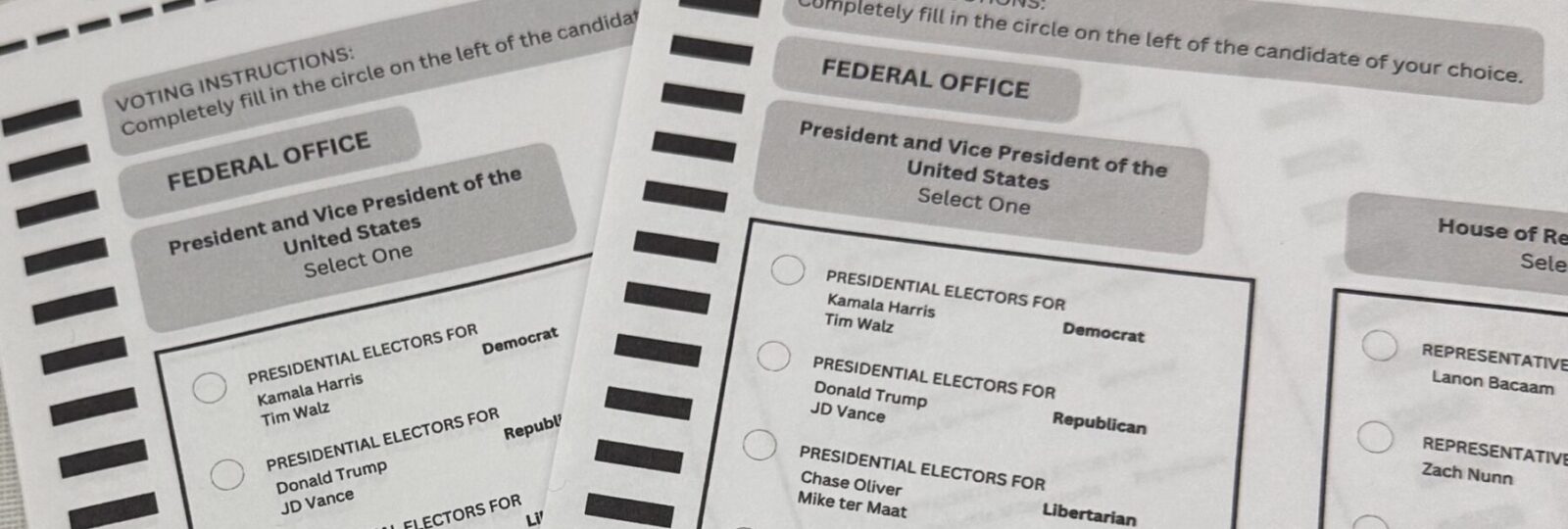Federal and State Voting Breakdown
Share this story

Voting in the United States has a long history of being exclusive, rather than inclusive.
Ever since America’s independence in 1776, it has been a symbol of democracy and freedom. Yet, only the top few select Americans were allowed to enjoy that freedom. In the beginning, only white male landowners or taxpayers were allowed to vote. This did not change until 1850, when all white men were allowed to vote, regardless of property status. The 13th and 14th Amendments, ratified in 1865 and 1868, laid the groundwork for the 15th Amendment, which supposedly prohibited states from denying citizens the right to vote based on race. However, numerous barriers, such as class and education, were created to make it more difficult for minorities to vote. Women were not included in the voting discussion until the 19th Amendment was ratified in 1920, granting them the right to vote.
Historian Martha S. Jones, author of Vanguard: How Black Women Broke Barriers, Won the Vote, and Insisted on Equality for All, stated in an interview with the New York Times, “The 19th Amendment did not eliminate the state laws that operated to keep Black Americans from the polls via poll taxes and literacy tests—nor did the 19th Amendment address violence or lynching…. many Black women faced the beginning of a new movement for voting rights in the summer of 1920, and it’s a struggle they will wage alone because now the organizations that had led the movement for women’s suffrage are disbanding.”
It was not until 1965 that the Voting Rights Act was passed, prohibiting racial discrimination in voting, that Black women could join white women at the polls. While America became a free nation almost two hundred years before, it will not be a completely free nation until all are free to be heard, to be seen and to have a voice in America’s future. The right to vote has been fought for centuries, yet close to 90 million eligible voters did not exercise that right and vote in the 2024 election. For voters young and old, the process can be confusing and daunting. How does one register to vote? Are there other elections besides the presidential election? Does every vote actually matter?
This article dives into the local and national elections, voting eligibility requirements and registration, political parties and the impact a vote can have. Scan the QR code to read the rest of the article, or go to tenthstreettimes.com.
Local and State Elections
Waukee School Board
Iowa school board elections take place on the first Tuesday in November on odd-numbered years. An elected school board official will serve a term of four years. There are seven members of the Waukee school board with their respective four-year terms: Michael Schrodt, 2021-2025; Armel R Traore dit Nignan, 2021-2025; Kate Boonstra, 2023-2027; Lori Lyon, 2021-2025; Wendy Marsh, 2023-2027; Jaime Secory, 2021-2025; Michael Trettin, 2023-2027. The school board holds meetings on the second and fourth Monday of each month. They hold the power to make decisions regarding all Waukee schools.
Senators
The United States Congress is composed of two parts: the Senate and the House of Representatives. The Senate is the upper chamber of the United States Congress. The Senate shares legislative power with the House of Representatives to create and pass laws. The Senate is also able to approve or reject presidential nominations and to try impeachments. Each state has two senators, who serve a term of six years. Every two years, ⅓ of the Senate is up for reelection, which helps ensure stability and continuity.
Currently, the two senators from Iowa are Joni Ernst and Chuck Grassley. Ernst is a Republican in her second term in the Senate and will be up for reelection in 2026. Grassley is also a Republican and is in his eighth term as senator, having taken office in 1981. Grassley will be up for reelection in 2029. Currently, Grassley is the oldest U.S. senator at 91 years old.
House of Representatives
The House of Representatives works with the Senate to create and pass federal laws. The House of Representatives differs from the Senate in that each state does not have the same amount of representatives. The number allowed is based on the state’s population. Iowa has four representatives, all of whom are Republican: Randy Feenstra, Ashley Hinson, Zach Nunn and Marianette Miller-Meeks. The election for the House of Representatives is also every two years but, unlike the Senate, every seat in the House is up for election. There are four districts in Iowa, and each district has a representative.
National Elections
Presidential
The Presidential election is probably the most well-known election in the United States. This election occurs every four years. Candidates spend months campaigning across the country, and smaller elections dictate which candidates are most popular and can move forward.
About six to nine months before the election is when states will hold primaries. Voters will cast anonymous ballots with their top candidate, and officials tally up the votes and award delegates to the winning candidates, who will go on to represent them at the national convention. Caucuses are similar, but they are run by a political party. Candidates will either be chosen with secret ballots, or by having participants gather in groups depending on which candidate they prefer. Each group’s candidate will give a speech and attempt to convince participants to join their group.
Almost all states hold primaries, some hold both caucuses and primaries and a few only hold caucuses. Iowa is known for being one of the states that begins the presidential election season by holding its caucus.
National Conventions
The Democratic and Republican National Conventions formally declare their party’s nomination for president. State delegates chosen and awarded at the primaries endorse their favorite candidate, and the nominees for each party are announced at the end. To become the presidential nominee, a candidate usually needs to have won a majority of the delegates. Once the nominees are selected, they will announce who they are choosing as their running mate.
Electoral College
Electoral votes are distributed to each state based on their population, as determined by the census. Each state has at least two votes for each senator, and then additional votes for each state’s representative in the House of Representatives. Once the popular, or general, vote is over, the electors for each state cast their vote for vice president and president. These votes are then sent to Congress and counted. There are 538 total electors and the president needs a majority vote of 270 of the votes in order to win. Electors are usually elected officials or significant party members, and the process is determined by each state’s legislature. Most electors are nominated during the nominating conventions.
Parties
There are two main political parties in the U.S.: Republican and Democrat. While these are the most well-known parties, citizens can also vote third party. Third party just means a party other than Republican or Democrat, and it can include The Green Party, Libertarians, Constitution Party and Natural Law Party. An independent candidate or voter is one who does not associate or identify with any party.
The Democratic party typically values social and economic equality, social welfare programs, environmental protection, reproductive freedom and gun control.
The Republican party typically values less government involvement, gun rights, strong national defense, immigration control and reduced government spending.
Voting
Voter Eligibility
In Iowa, citizens are allowed to register to vote at 17, given that they will turn 18 by the election. One cannot vote if they are a convicted felon unless their voting rights have been restored. One also cannot vote if they have been deemed mentally incompetent by a court, or if they are registered to vote in multiple places.
Voter Registration
Voter registration has led to a decline in voters. The national voting registration system makes it harder for minorities to register. In North Dakota, however, voters do not have to register. All they have to do is provide a driver’s license, a free nondriver’s ID card, or a tribal identification card. To register in Iowa, a voter registration form must be completed and turned in to the county auditor, or a form can be completed online. The deadline to register is 15 days before the election.
Absentee Ballots and Mail-In Voting
The National Voter Registration Act required states to provide mail-in voting to everyone, which helped eliminate some barriers to getting to the polls. An absentee ballot is also an alternative to going to the polls on election day and can be collected from the state and then returned once filled out. States will automatically send ballots to all registered voters before an election, which can then be filled out and mailed back.
What Is On the Ballot?
Ballots will have different options for candidates, as well as different community proposals. For example, there were three proposals to vote on on the Waukee ballot. First was the Aquatic Center bond referendum to put a new aquatic center in Waukee. There was also the Dallas County Criminal Court building bond referendum to construct a new criminal court building. Unfortunately, neither of these proposals received the needed percentage of votes to pass. Lastly, the proposal to expand the Dallas County Board of Supervisors from three members to five members was the only proposal that passed.
What Now?
Living in a democratic country is not only a privilege but also a responsibility. Americans need to take time to morally reflect and study their choices before voting. Each candidate has different priorities, backgrounds and plans for their term.
Sometimes, when neither candidate for president has the correct morals, values or priorities on major issues, it can be difficult to know how to vote. There is not always a clear “better” candidate, and a lot of the time, Americans have to examine their options and choose the lesser of two evils. If it is impossible to imagine going against one’s morals by voting for either candidate, there is the option not to vote. While voting is an important pillar of democracy and America, it is not required. Sometimes, when voters are uneducated about the candidates and issues they are voting on, it is better for them to withhold their vote rather than choose randomly. Of course, the best scenario is to research each candidate and thoughtfully consider the choices before heading to the polls to intentionally cast a vote.
While some races are won by a landslide, quite a few are very close, toss-up races. For example, Zach Nunn beat Lanon Bacaam by four percent in the election for Iowa Congress this year, which is only around 15,000 votes.
Bacaam noted his loss in a statement, “While this is not the outcome we wanted, the fight for a better Iowa must continue… Thank you to everyone who stood with me in this race.”
While 15,000 votes may seem like a lot, it is just six percent of the 800,000 people who live in Iowa’s third district, according to the census. This race is one of the most recent, local, close races, but there are many others. Some, where candidates win or lose by an even smaller margin of votes. Even though a single vote might not be the deciding factor in large elections, each vote contributes to the total that determines the outcome. When individuals think their vote does not matter and choose not to participate, it leads to a significant number of non-voters, potentially altering the election results. Therefore, the act of voting is crucial in ensuring that every citizen’s voice is heard and that the elected officials represent the whole of America and not just those who choose to vote.
As prominent civil rights leader and politician John Lewis once said, “The vote is the most nonviolent tool we have.”
